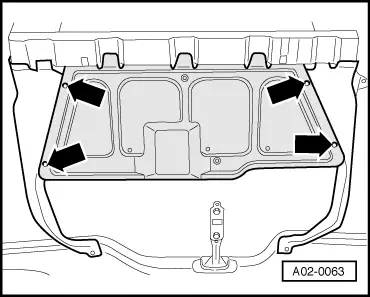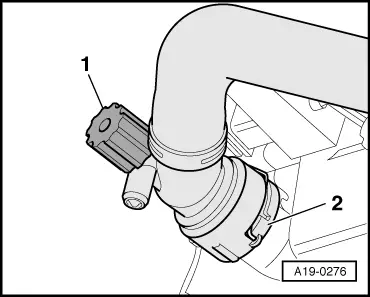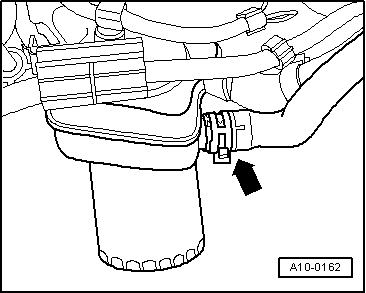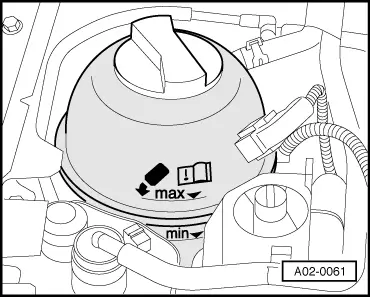|
All models:
-
‒ → Also disconnect lower coolant hose on oil cooler -arrow-, and drain off remaining coolant.
Filling
Notes:
-
◆ The cooling system is filled all year round with a mixture of water and antifreeze/corrosion protection agent.
-
◆ Only use coolant additive G 012 A8 D - meeting specification TL VW 774 D.
Identification: red colour
Important
G
-
◆ If the fluid in the expansion tank is brown, this means G 012 A8 D has been mixed with another type of coolant. In this case, flush out the cooling system and fill with fresh coolant. To flush the system, fill it with clean water and run the engine for about 2 minutes. This should remove as much of the old coolant as possible.
-
◆ G 012 A8 D and coolant additives marked "meeting specification TL VW 774 D" prevent frost and corrosion damage and stop scaling. and at the same time raise the boiling point of the coolant. For these reasons the cooling system must be filled all year round with the correct anti freeze and anti corrosion additive.
-
◆ Because of its high boiling point, the coolant improves engine reliability under heavy loads, particularly in countries with tropical climates.
-
◆ Protection against frost must be assured to approx. -25°C (in countries with an arctic climate to approx. -35°C).
-
◆ The coolant concentration must not be reduced by adding water even in warmer seasons and in warmer countries. The anti-freeze ratio must be at least 40 %.
-
◆ If greater frost protection is required in very cold climates, the amount of G 012 A8 D can be increased, but only up to 60 % (this gives frost protection to about -40 °C), as otherwise frost protection is reduced again and cooling effectiveness is also reduced.
-
◆ Only use clean drinking water to mix the coolant.
-
◆ If radiator, heat exchanger, cylinder head or cylinder head gasket is replaced, do not reuse old coolant.
-
◆ Use special tool T10007 to check frost protection of coolant additive G012 A8 D in cooling system.
Recommended mixture ratios:
|
|
|---|
|
Frost protection to
|
Anti freeze concentration
|
G 012A8 D 1)
|
Water1)
|
|
-25 °C
-35 °C
|
40 %
50 %
|
2.0 l
2.5 l
|
3.0 l
2.5 l
|
1) Coolant quantity: 5.0 litres (may vary depending upon the vehicle equipment)
|









